Only in Istanbul
Cooking up a new generation of chefs
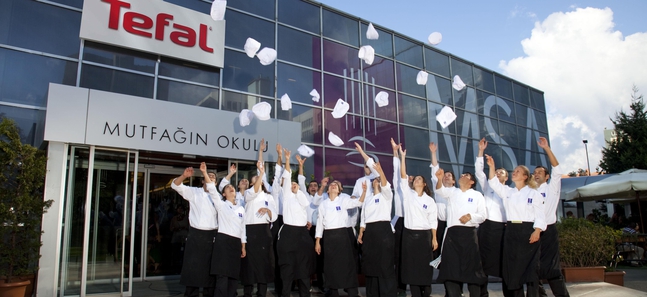
Posted: Mon Feb 17 2014
For the past ten years, one Istanbul institution has been transforming the art of cooking – an occupation once passed down from father to son or master to apprentice in Turkey – into a bona fide profession. Now, they are getting ready to take their message worldwide.
Founded by Mehmet Aksel in Istanbul in 2004, Mutfak Sanatları Akademisi (Culinary Arts Academy) is one of the first private professional culinary schools in Turkey – and certainly the most well known. It remains the only vocational education school in Turkey accredited by the UK-based City & Guilds as well as the World Association of Chefs’ Societies (WACS). In addition to kitchens and seminar rooms, the school also boasts Turkey’s first and only kitchen auditorium, a restaurant, a kitchen laboratory for R&D, a library and even a museum featuring a collection of rare historic culinary pieces.
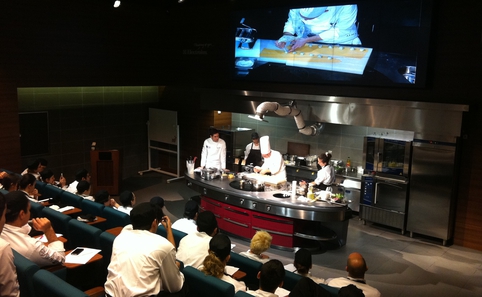
Professional training and amateur workshops
‘Our promise is to equip young people with the skills and knowledge necessary for them to enter the workforce in a very attractive and very global business,’ says General Manager Sitare Baras, a long-time friend of the school’s founder who joined MSA in 2009.
Although the young student body – whose ages range from 20 to 25 – was mostly Istanbul-based at first, MSA has grown into a national powerhouse with students arriving from nearly 40 cities throughout Turkey. According to Baras, the popularity of MSA has to do with the rapid growth of the food and drink industry hereabouts. ‘In the early years, cooking wasn’t even considered a profession,’ Baras confides. ‘Now, almost the entire sector calls us when they need personnel, or they ask for our opinion when they’re about to embark on a new project. They’ve grown to believe in the need for a basic educational system.’
The educational portfolio at MSA is constantly growing. In addition to regular chef and pastry chef training, the school also offers programmes in F&B management, bartending, food styling and even wait staffing. The curriculum is based on international programmes that have been adapted to meet local requirements, with experts frequently flown in to Istanbul to impart their knowledge on MSA’s own training chefs. In addition to its host of professional courses, the school also hosts around 25 daily workshops bringing in a total of around 600 participants each month.
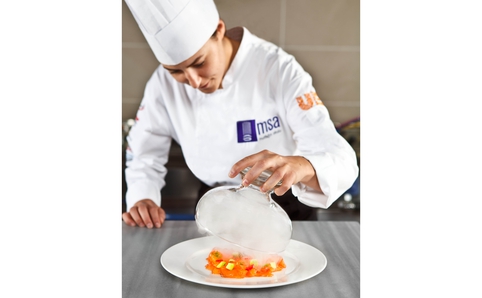
Exporting culinary talent
One of the first graduates of MSA, Başak Ertunç boasts an impressive professional resume: an internship at The House Café, an Istanbul chain, as well as a two-year stint at the popular Japanese restaurant Tokyo. Upon moving to Geneva, Ertunç decided to concentrate on Swiss pastry and chocolate arts, and she currently interns at the Grand Hotel Kempinski Geneva, hoping to open up her own restaurant in five years.
Ertunç remembers seeing an ad in the newspaper and going to check out the school. ‘Once they gave me a tour of the kitchens and explained what type of education I would receive, I had already made up my mind to attend,’ she recalls. ‘The knowledge I gained and the people I met during my training proved to me that this was absolutely the right decision.’
Ertunç chalks up her success to her own love of cooking but believes her education at MSA taught her the academics behind the job. ‘Sometimes when you work, you don’t have the time to question why you do some things, but thanks to the education I received, I learned the why and the how.’ Ertunç also has a word of caution for future chefs: ‘People interested in this job should know that school kitchens are completely different from real kitchens. The equipment, the colleagues, even the hygiene will shock you sometimes. It’s very important to truly love this job.’
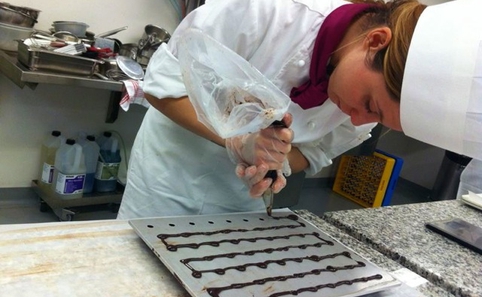
Başak Ertunç hard at work
Chef Sabri Eşitmez is an ex-construction engineer who signed up to study at MSA after finding that his chosen career did not satisfy him. Upon completing his internship at Swissôtel The Bosphorus, he managed to snag a coveted position at the prestigious J&G Grill at The St. Regis Deer Valley Resort in Utah, US. ‘For anyone who wants to receive quality professional education in the culinary arts or for anyone who has even a little interest in the kitchen, MSA is the first and best school that will come up with a little bit of research,’ he says. ‘If I am working on the staff of a three-time Michelin-starred chef like Jean Georges, it is because of the self-confidence I gained from my training at MSA and later at my great internship location.’
Cihan Erol Etlik is a fellow recent MSA graduate, ex-Swissôtel The Bosphorus intern and current chef at the seafood station in J&G Grill in Utah. After growing up spending a considerable amount of time in the kitchens of his grandmother and aunt, Etlik found out about MSA via the internet back in 2008 but had to postpone his culinary education until 2013 due to financial obligations. He echoes his fellow graduates’ enthusiasm for the school’s disciplined approach and its kitchens equipped with the latest technology, and adds, ‘I recommend MSA particularly to young students who are still in high school and considering studying gastronomy at the university level. I believe that this job should truly not be done without the proper training, and the education received must be reinforced with an internship as soon as possible.’
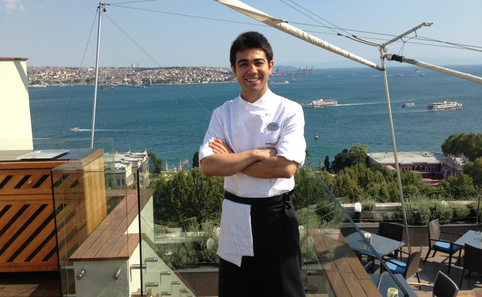
Cihan Erol Etlik
Going global
MSA currently has a few international students who travel to Istanbul, most of them coming in from Turkic Republics and from schools throughout the network in order to learn more about Turkish cuisine.
But that’s all about to change, says Baras, as the school is starting off 2014 with a brand new, ambitious programme: the Turkish Cuisine to the World Movement. The idea was born when MSA executives and instructors were touring schools around the world to improve their curriculum. ‘We saw that there wasn’t even a trace of Turkish cuisine or even Eastern Mediterranean cuisine being offered, and when we inquired about it, we learned that it was due to a lack of curriculum,’ she says. ‘So we worked with consultants, Turkish academics and chefs as well as City & Guilds, Pearson and Scottish Qualification Authority to develop an academic programme on Turkish cuisine. We worked on this for three years, touring all of Anatolia, and in the end we came up with a two-week programme that focuses on symbolic foods from Istanbul palatial cuisine, aka classic Ottoman cuisine, as well as regional Anatolian cuisines.’
The recipes were standardised and the course accredited by the Scottish Qualification Authority so that students can receive an internationally recognised diploma in Turkish cuisine at the end of their studies. So far, MSA has introduced the programme to schools within its network – first to ALMA in Italy, then to Johnson & Wales University in Rhode Island in the US, and most recently to South Downs College in the UK. ‘Our goal for 2014,’ Baras says, ‘is to find similar platforms to introduce our foods and offer examples of Turkish cuisine that people may not know – to go beyond just döner kebap.’
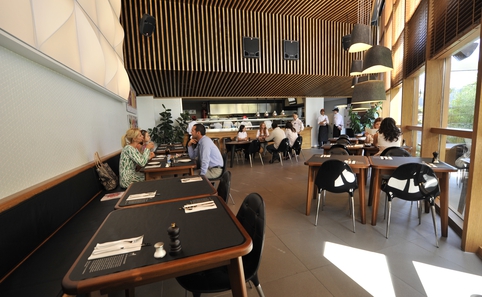
Tweets
- About Us |
- Work for Time Out |
- Send us info |
- Advertising |
- Mobile edition |
- Terms & Conditions |
- Privacy policy |
- Contact Us
Copyright © 2014 Time Out Tokyo




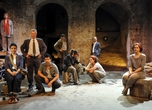

Add your comment